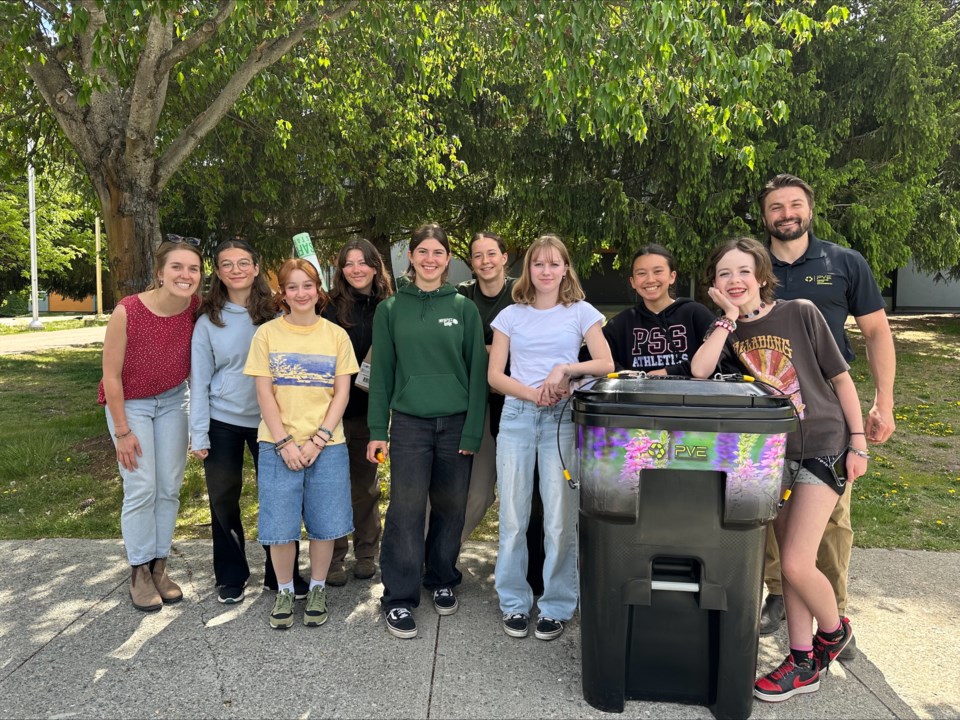Pemberton Secondary’s Eco Club has partnered with Pemberton Valley Environmental (PVE) to kick off a school-wide composting program, designed to divert waste from landfills.
The students have installed bins and signage around the school to support the disposal of food waste, disposable cutlery, plates, and napkins. The pilot project will run until the end of the school year—after which they hope to formalize composting at Pemberton Secondary School (PSS) for the years ahead.
The Eco Club’s work isn’t as simple as just installing bins around the school. In the run-up to the project, the group ran a survey of the school’s staff and students. They found some 70 or 80 per cent of the 50 people surveyed already compost, personally. The team is looking to get those numbers up in the school itself.
“We did presentations around the classes to inform all the students and teachers to make sure they know what can and can't go into the bins,” said club member Sola Skeels. “And then we got these big bins that are right now in the foods room and in the commons.”
And the students are "continuing to inform people all the time,” added her fellow composting project leader Sayah DesBrisay. “We're going to make some posters to make it more obvious what goes in the compost.”
The team was inspired to tackle waste management for its outsized impact on climate change.
An SLRD report from 2022, with stats on landfills from around the Sea to Sky, found 38 per cent of trash that went into the Pemberton Transfer Station was organic waste.
“And when that compost is trying to decompose in the landfill, it releases really toxic gasses like methane, which is a lot worse for the planet,” noted DesBrisay. “And so by providing compost at our school, we're going to track the data of how much per week is not ending up in the landfill, and seeing what our impact is on that.”
Methane is a significantly more potent greenhouse gas than carbon dioxide—particularly in the short term. It traps about 84 times more heat than CO₂ over 20 years, making its immediate impact more intense. In Canada, approximately 17 per cent of methane emissions come from landfills.
Partnering with PVE
At first, the team wondered if there was a way to use food waste as fertilizer for the garden at the school. But they nixed the idea because of the risk from bears and concerns over having to be more selective with what kinds of organics were going into the compost.
So, they needed a way to get the waste off-site.
The transportation issue proved a key hurdle for a previous attempt at developing a composting project at PSS, when AWARE Whistler partnered with Pemberton Secondary students in 2024 to support student climate action projects. DesBrisay remembers one student’s composting project had struggled for lack of means to get the waste off-site.
This year, the students teamed up with PVE, a waste collection company with clients in Pemberton, Birken and Whistler.
“We made a plan that we're going to provide [the Eco Club] with all the necessary tools for getting composting programs started at the school at no cost,” said PVE owner Colin Hamilton. “We are also going to start monitoring and weighing their compost, and hopefully at the beginning of next school year, we'll have our own section at Sea to Sky Soils.”
“This is going to be like a five-week trial to see how we can build this moving into the future, and kind of integrate it as one of their primary sources of disposal,” he added. “We're trying to look at how much compost they're producing, and moving forward, we're going to be trying to get that number to go up and their landfill number to go down.”
What’s next?
The pilot program launched a couple weeks back with a handful of bins around the school.
At the end of the year, the Eco Club will crunch the numbers, draw up a formal contract with PVE and present it to the school board for approval. It’ll be the Club’s second presentation to the school board, following the initial pitch.
They’re hoping to continue running the program in the years to come.
“I just think the students at the high school are awesome for taking this on, and it was something they're passionate about,” said Hamilton. “They've been just great to work with, and we hope to get some serious results from this.”
Both students said participating in the Eco Club relieves some climate anxiety or climate grief. They suggest that anyone who feels overwhelmed by the scale of climate change sign on with a group to make a tangible difference in their communities.
“It makes you feel like you can make more of a difference than just sitting there and feeling sad about it,” said Skeels. “You have something that you can do, and you have people around you who feel the same way.”
Added DesBrisay: “Even if you feel like you're just a small factor in this huge global issue, just doing some kind of work—not just talking, but taking action—really helps with [your] peace of mind."
Fortunately, the Pemberton Valley is home to a great many non-profits who look out for the area’s unique, picturesque environment. From the Stewardship Pemberton Society to the Pemberton Wildlife Association, you can find a list of volunteer organizations to sign on with through the SLRD’s list of community organizations.




